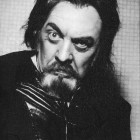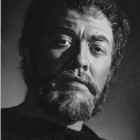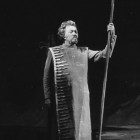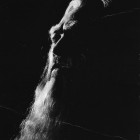David Ward Suggest updates
Born Dumbarton, 3 July 1922.
Died Dunedin, New Zealand, 16 July 1983.
Scottish bass.
Historic importance
David Ward was one of the most important Scottish singers in living memory, with a notable international career, and a vital presence in the early years of Scottish Opera. Ward had an effortlessly powerful, but attractively soft-grained voice, able to convey strong emotion. Unusually tall, he was easily able to dominate the stage, and was an ideal exponent of the major Wagner and Verdi bass and bass-baritone repertoire.
Early career
David Ward served in the Royal Navy during World War ll, generally on escort duty with Atlantic convoys, renowned as a horrifying experience for all concerned. He then trained at the Royal College of Music with Clive Carey. Much later (c1962) he studied his major Wagner roles in Munich with Hans Hotter, who had been the dominant Wotan of his own generation. Ward joined the basses in the Sadler’s Wells Opera Chorus in 1952, quickly making an impression and being given his first solo role the following year – the Old Bard in The Immortal Hour (Boughton). He created the role of Captain Hardy (also very tall) in Lennox Berkeley’s Nelson (1954) and remained a principal with the company from 1953 to 1959. Many years later, in 1972, he returned to revive one of his old roles, Bartók's Bluebeard, at the Coliseum.
During the fifties Ward sang in Scotland during the annual Sadler’s Wells tours, when his roles included Dr Grenvil in La Traviata (1957) and Colline in La Bohème (1958). During the 1959 tour he sang Zuniga (Carmen), Don Fernando (Fidelio, conducted by a young Colin Davis), and Monterone in Rigoletto.
Ward also returned to Scotland for appearances with amateur companies, including Zaccaria in Nabucco (Edinburgh 1957) and Méphistophélès in Faust (Dundee 1958).
Career development and maturity
Ward's major appearances with Sadler’s Wells included the title roles in Bartók’s Duke Bluebeard’s Castle and Wagner’s Flying Dutchman, and this last gave an indication of how his career would develop. His Covent Garden debut followed in 1959, as Pogner (Die Meistersinger von Nürnberg), followed by Fasolt (Das Rheingold), Hunding (Die Walküre) and Morosus (The Silent Woman by Richard Strauss).
At the recommendation of Rudolf Kempe, he was engaged at the Bayreuth Festival in 1960-2, singing Fasolt, Titurel (Parsifal) and Nightwatchman (Meistersinger). He then studied the role of Wotan in Munich with Hans Hotter, who had been impressed by his potential. When Covent Garden was directed by Georg Solti, Ward sang major parts regularly. His Wagner roles included Heinrich (Lohengrin), Wotan and King Mark. His Verdi repertoire extended to King (Aïda), King Philip (Don Carlos), Fiesco (Simon Boccanegra), Padre Guardiano (La forza del destino) and Zaccaria (Nabucco). Other roles with the Royal Opera included Sarastro, Commendatore, Don Basilio, and Rocco, as well as Arkel (Pelléas et Mélisande), Ivan Khovansky (Khovanshchina), Crespel (The Tales of Hoffmann), the Grand Inquisitor (L'Africaine) and the Pope in Benvenuto Cellini, which last he sang with the company on its visit to La Scala in 1976.
Scotland
David Ward made his first appearance with Scottish Opera in 1964 as the Commendatore (Don Giovanni). He returned the following season for Boris Godunov, and in 1966 and 1967 for Wotan in Die Walküre and Das Rheingold as the company assembled its first Ring Cycle. The Wanderer in Siegfried and a complete cycle followed in 1971. In 1973 he added King Mark in Tristan und Isolde and repeated Boris Godunov in 1974. His last new roles with the company were Banquo in Macbeth and Pogner in Die Meistersinger, both in 1976. He came to the Edinburgh Festival twice as a guest with visiting companies other than Scottish Opera – in 1960 with Glyndebourne (I Puritani with Joan Sutherland) and in 1968 with the Hamburg Opera as the Flying Dutchman.
International activity
David Ward enjoyed an extensive international career, singing regularly in the USA (Dutchman at the Met), Germany and Italy (Wotan at La Scala, Boris in Palermo). In 1967 he sang Wotan in five Ring cycles in Buenos Aires. This fee, he recalled, enabled him to retire to New Zealand, where he bought a farm.
Recordings
David Ward did not feature in many studio recordings of opera. He sings Hunding in Erich Leinsdorf’s recording of Die Walküre, made by Decca in 1961. In 1963 he featured as Monterone in Solti’s recording of Rigoletto. He is Arkel in the famous Covent Garden recording of Pelléas et Mélisande conducted by Pierre Boulez in 1970.
There is a live recording of Parsifal from Bayreuth in 1960. The conductor is Knappertsbusch and Ward sings the brief role of Titurel. The rest of the cast is excellent, including Régine Crespin as Kundry. Glyndebourne also released a recording of I Puritani made in Edinburgh.
He is the bass soloist on a 1962 recording of Messiah. The LSO and LSO Chorus are conducted by Sir Adrian Boult with a fascinating team of colleagues - Joan Sutherland, Grace Bumbry and Kenneth McKellar.
David Ward is also featured as Friar Lawrence in the excellent recording of Berlioz's dramatic symphony Roméo et Juliette with Pierre Monteux conducting the London Symphony Orchestra. It was recorded in Walthamstow Town Hall in 1962 and eventually appeared on CD under the Millennium Classics label.
There is also a BBC re-issue of a 1963 Proms performance of the Verdi Requiem, with Giulini and the Philharmonia.
Roles in Scotland
- Ferrando captain of Di Luna's guard
-
Trovatore 1957
- Doctor Grenvil
-
Traviata 1957
Traviata 1958
- Simone a cousin, aged seventy
-
Gianni Schicchi 1957
- Zaccaria High Priest of the Hebrews
-
Nabucco 1957
- Marcel Raoul's servant
-
Huguenots 1958
- Méphistophélès the devil
-
Faust 1958
- Colline a philosopher
-
Bohème 1958
- Don Fernando the King's Minister
-
Fidelio 1959
- Zuniga a lieutenant of dragoons
-
Carmen 1959
- Count Monterone
-
Rigoletto 1959
- Lord Gualtiero Valton Lord Walter Walton, a Puritan and Governor General
-
Puritani 1960
- Commendatore an elderly aristocrat
-
Don Giovanni 1964
- Boris Godunov Tsar of Russia
-
Boris Godunov 1965
Boris Godunov 1974
- Wotan father of the Valkyries and Volsungs
-
Valkyrie 1966
Valkyrie 1971
- Wotan leader of the gods
-
Rheingold 1967
Rheingold 1971
- Dutchman
-
Fliegende Holländer 1968
- Wanderer Wotan in disguise
-
Siegfried 1971
- King Mark King of Cornwall, Tristan's uncle
-
Tristan und Isolde 1973
- Veit Pogner a goldsmith
-
Mastersingers of Nuremberg 1976
Mastersingers of Nuremberg 1977
- Banquo a general in King Duncan's army
-
Macbeth 1976
Macbeth 1977




